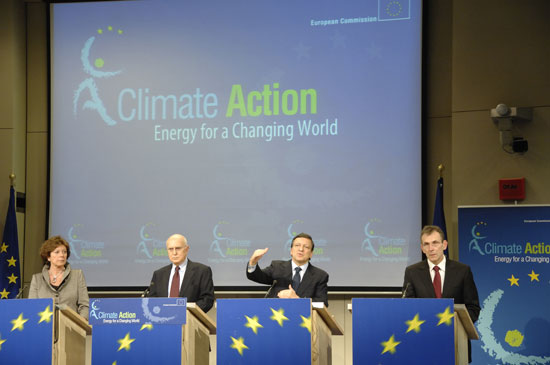

This year of the apocalypse actually began with good news about climate change. In a perfect example of soft power with an edge, the European Union decided to leverage its weight as the world’s largest economic market to compel the majority of the world’s airlines to participate in its Emissions Trading Scheme (ETS). This bold move promises to both directly cut emissions, as well as provide incentive for airlines to innovate and increase their efficiency globally — and it foreshadows what could be a new approach to tackling the world’s biggest, most pressing challenge.
From 2012 on, emissions permits will be issued to any airline that uses an E.U. airport. Emissions will be calculated for the total duration of all flights that either depart from or land in the E.U., not just the portion of the flight that takes place in E.U. airspace. Airlines who exceed their emissions allotment must purchase carbon offsets for the excess amount of pollution, and the number of permits issued will decrease each year. Enforcement would include fines and potentially prohibition from operating in European airports.
Yet, as is to be expected, other major economic players have sharply reacted against the E.U.’s decision. China, the U.S. and nearly two dozen other nations have all threatened retaliation in some form, with China even banning airlines from participating in the scheme, and similar legislation present before Congress in the U.S.
The resistance is ultimately shortsighted and costly — the effect is no more than a few dollars per ticket, and gains in fuel efficiency will save airlines incredible sums in the future anyway. It’s kind of like the way Americans would be on the verge of armed revolt in the face of a gas tax to raise gas prices to a level that reflects the true cost of consumption, and would spur the investment in alternative energy infrastructure that would make electric vehicles and so on even more cost effective. But we waste trillions of dollars on failed Middle East policy to safeguard access to the same hydrocarbons slowly choking the world’s economic future.
To its credit, the E.U. has pledged to remain firm in support of its policy, even with the threats of looming trade war. For decades, the world has seen summit after summit, negotiation after negotiation, and panel after panel of bloviating bureaucrats. Look at where we are and how little has been accomplished. Agreements are rarely reached, and when they are, individual or blocs of nations stymie true action.
Now, before the Rio 2012 Earth Summit, is a perfect opportunity to set a visionary agenda — one that the world sees will be backed up by credible action from its foremost economic power. Consensus is fantastic, and international cooperation is always something to be strived for. But time is running out, the costs of inaction will be immense, and sometimes soft power needs to be backed by hardliners. By being this hardliner, the E.U. has the opportunity to cut through much of the meandering, and send a signal that change is coming. The rest of the world can be on board or not, nonetheless, but the necessary action will be forced nonetheless.
In the past, climate change agreements have always depended on signatory nations to come through on their own. This voluntary system is failing, and even if nations can’t impose consequences on each other directly, big powers with the will to do so can mold, prod and force global industry in effective ways.
Many E.U. leaders have been stubbornly committed to ‘pain now, gain later’ austerity measures. Misapplied though they may be to the detriment of tackling the euro crisis, just such a stubborn commitment to that philosophy is just what the world needs on climate change.
What is up with your obsession with Europe?